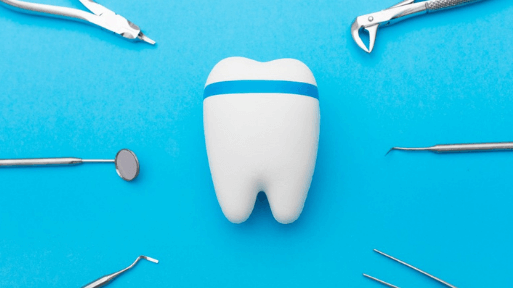What causes teeth grinding?
 Researchers estimate 12-31% of adults grind their teeth at night, most of whom are undiagnosed. The most common cause of teeth grinding while you’re awake is stress and anxiety. The most common cause of teeth grinding while sleeping is a sleep disorder like obstructive sleep apnea. Here’s a list of seven common causes of teeth grinding.
Researchers estimate 12-31% of adults grind their teeth at night, most of whom are undiagnosed. The most common cause of teeth grinding while you’re awake is stress and anxiety. The most common cause of teeth grinding while sleeping is a sleep disorder like obstructive sleep apnea. Here’s a list of seven common causes of teeth grinding.
1. Sleep Apnea
Many experts agree that the most common underlying causes of nighttime teeth grinding are sleep apnea and sleep-disordered breathing. If you grind your teeth at night, it’s likely your brain signaling you to grind your teeth so you wake up just long enough to start breathing again. Sleep apnea may be caused by poor airway health—when your tongue is too big for your oral cavity, obstructing the upper airway and resulting in halted breathing during sleep.
Should you use a manual or electric toothbrush?
 Manual and electric toothbrushes are both great options—as long as you’re brushing at a 45-degree angle on your gums and use a soft bristled brush. However, there are pros and cons of both. We’ve compiled a list to help you make the best decision for your teeth.
Manual and electric toothbrushes are both great options—as long as you’re brushing at a 45-degree angle on your gums and use a soft bristled brush. However, there are pros and cons of both. We’ve compiled a list to help you make the best decision for your teeth.
Electric Toothbrush: Pros
- An electric toothbrush is easy to use. Not to mention, electric brushing is an exciting way to clean your teeth.
- According to a consumer report, electronic toothbrushes remove 21% more plaque than manual brushes.
- Plaque can build up in hard-to-reach places, such as in your braces. If you’re having a hard time keeping your braces clean, it might be time to make the switch to a brush that has a vibrating feature.
- Lots of electric toothbrushes have a built-in timer. If you find yourself racing through your dental hygiene routine, an electric toothbrush can help automatically slow things down for you.
Should you brush or floss first?
 Ah, the age-old question: Is it better to brush or floss first? (Or does it really matter?) Let’s get to the bottom of things.
Ah, the age-old question: Is it better to brush or floss first? (Or does it really matter?) Let’s get to the bottom of things.
In general, you should be in good shape if you do them all consistently, but there are benefits to doing them in a particular order. Here’s a brief look at the most widely recommended order:
1. Floss first
Using the analogy of sweeping a floor before you mop it, flossing gets rid of large particles of food stuck between your teeth, which allows the toothbrush bristles and fluoride in your toothpaste to reach tiny gaps and crevices that would be otherwise blocked. Additionally, if you brush first, you’re more likely to spend time on brushing but rush through flossing. Flossing first ensures you’ll give the task the time and attention it deserves.
5 foods that support a healthy mouth
 Your teeth and gums require proper nutrition to function at their best. This means getting enough of the right kinds of minerals, which serve as building blocks for your teeth and their protective enamel. By sticking to the right foods, you can ward off cavities and reduce your risk of gum disease.
Your teeth and gums require proper nutrition to function at their best. This means getting enough of the right kinds of minerals, which serve as building blocks for your teeth and their protective enamel. By sticking to the right foods, you can ward off cavities and reduce your risk of gum disease.
Green Tea
Research suggests that green tea can boost periodontal health by preventing bone resorption, reducing inflammation and inhibiting the growth of bacteria.
Raisins
Sticky foods that can get between your teeth are often best to avoid. However, raisins can be an exception. According to a study out of Chicago College of Dentistry, raisins contain powerful phytochemicals that appear to fight off the bacteria that cause cavities and gum disease.
Why You Shouldn't Ignore a Missing Tooth
 From draining your confidence to potentially opening the door for disease, a missing tooth can have big impacts. Here are three reasons you shouldn’t ignore a missing tooth.
From draining your confidence to potentially opening the door for disease, a missing tooth can have big impacts. Here are three reasons you shouldn’t ignore a missing tooth.
A Missing Tooth Can Lead to Gum Disease
Your mouth is a breeding ground for many different kinds of bacteria. When a tooth falls out, it leaves a wound in your gum tissue—leaving you susceptible to infection, or ever worse: gum disease. When you develop gum disease, your gum tissue starts to recede, which can lead to even more tooth loss. What’s more, gum disease is linked to a number of serious health conditions including heart disease and diabetes.
Why Straight Teeth Matter
 Straight teeth are nice and all, but do they really matter? The truth may surprise you.
Straight teeth are nice and all, but do they really matter? The truth may surprise you.
The Social Benefits of Straight Teeth
One of the first things people notice about us is our smile, which makes it a powerful social tool. Studies found that nearly half of American adults believe a smile is the most memorable feature after they first meet someone. It was ranked ahead of the first thing a person says, their clothing and their smell.
Straight Teeth and Confidence
Kids with straightened teeth can gain a huge amount of self-esteem associated with doing better in school, forming strong bonds and friendships, resisting peer pressure and trying new things. The confidence that comes from loving your smile is also important for adults. Feeling good about yourself can greatly enhance your quality of life.
A Reduced Risk of Tooth Decay
Straight teeth are much easier to keep clean because you eliminate the extra nooks and crannies where plaque and food debris can hide. When plaque isn’t brushed away, the bacteria from the plaque interact with starches and carbohydrates in the food you eat and they release acids that erode your tooth enamel.
What is Cosmetic Dentistry?
 A “smile makeover” improves the appearance of your smile with cosmetic dentistry. If your teeth are stained, discolored, worn, chipped, broken, misaligned, misshapen, cosmetic dentistry can improve your smile—and your confidence.
A “smile makeover” improves the appearance of your smile with cosmetic dentistry. If your teeth are stained, discolored, worn, chipped, broken, misaligned, misshapen, cosmetic dentistry can improve your smile—and your confidence.
Teeth Whitening
Teeth whitening can be one of the simplest and least expensive ways to improve your smile. There are also whitening products available over the counter at retail stores for convenient at-home whitening.
Dental Veneers
Often called “Hollywood teeth,” dental veneers are wafer-thin, custom-made shells of tooth-colored porcelain or resin that cover the front surface of the teeth.
Dental Bonding
Bonding can repair decayed, chipped, cracked, or misshapen teeth. In dental bonding, a tooth-colored, putty-like resin, which is a durable plastic material, is applied to the tooth and hardened with an ultraviolet or laser light, bonding the material to the tooth. Your dentist then trims, shapes, and polishes it.
Are You Overbrushing?
 When trying to get our teeth as clean as possible, it can be easy to brush too hard or think a stiffer bristle is necessary. But how can you tell if you’re going too far? Here are four signs that you’re overbrushing.
When trying to get our teeth as clean as possible, it can be easy to brush too hard or think a stiffer bristle is necessary. But how can you tell if you’re going too far? Here are four signs that you’re overbrushing.
Toothbrush Damage
If your toothbrush’s bristles look flattened, you’re likely overbrushing. Keep on the lookout for bristles that “splay,” which is a sign you’re pressing too hard or brushing too frequently. Remember to replace your toothbrush every 3-4 weeks. In that time, bristles will wear down in that time creating minute serrated edges which damage teeth’s surface.
Sensitive Teeth
Brushing too vigorously or too often wears away the tooth’s protective enamel coating, exposing sensitive nerves to cold and hot temperatures. If you have a history of sensitive teeth and have taken steps to remedy the situation, but the sensitivity returns every few weeks, you could be overbrushing.
Bleeding Gums
Bleeding gums often happen when the thinnest layer of gum over the tooth is irritated and damaged, which can happen when you brush too often to let the gum heal itself. Pay close attention and see your dentist whenever you think your gums may be damaged.
Orthodontic Problems
While it is true that braces and dental implants need extra care to remain healthy, overbrushing can cause even more damage. Don’t run the risk of misaligning your braces, knocking dental bridges or wearing down cosmetic treatments as this will only mean more visits to your dentist and potentially complicate future treatments.
Schedule a Visit to the Dentist
Ready to get the healthy, happy smile you deserve? Schedule an appointment today.
How to Maintain Dental Implants
 Do you have a dental implant? Extend its lifetime with these three tips for maintaining your dental implant.
Do you have a dental implant? Extend its lifetime with these three tips for maintaining your dental implant.
Keep Up Your Brushing
Treat your implants like you would your natural teeth. You can use any type of toothbrush you like, whether it’s sonic, electric or manual. Be sure to consistently practice oral hygiene and you’ll be protected.
Be a Floss Boss
Unwaxed tape or a floss designed specifically for dental implants is highly recommended. You could also use a floss threader to help you maneuver in the hard-to-reach spaces. Flossing is just as important as brushing your teeth, and it plays an integral role in maintaining your gum health.
You can also incorporate the use of an oral irrigator, aka a water flosser. It shoots pressurized water into your mouth to aid in dislodging leftover debris hidden between your teeth. Another way to protect your gums and extend the life of your dental implants is with a gum stimulator. It’s a tool with a rubber tip that allows you to get into the gum pocket to remove debris and plaque that can gather over time.
Visit Your Dentist for Preventive Care
An essential way to ensure a long life for your dental implant is to maintain regular dental visits. If there is any lingering plaque or tartar, it can be removed before it causes any gum health issues. Ready to give your dental implant the best care it can get? Schedule an appointment today to experience a kind, professional, family-friendly dental environment.
How Long Do Veneers Last?
 A veneer is a thin piece of porcelain used to re-create the natural look of teeth, while also providing strength and resilience comparable to natural tooth enamel. Dental veneers are typically used to improve the appearance of teeth that are stained or discolored, which can be attributed to a number of different factors, including:
A veneer is a thin piece of porcelain used to re-create the natural look of teeth, while also providing strength and resilience comparable to natural tooth enamel. Dental veneers are typically used to improve the appearance of teeth that are stained or discolored, which can be attributed to a number of different factors, including:
- Chipped or cracked teeth
- Gaps
- Crowding
- Misshapen teeth
- Severe stains
Dental veneers are also used to quickly, effectively, and painlessly change the shape of one or more teeth that may be chipped, uneven, misaligned, or even worn down. They can also be used to close small gaps between teeth.
Benefits of Veneers
Because the shade of a veneer is carefully matched to your natural teeth, they’re difficult to differentiate them from your natural teeth. Porcelain is also naturally more stain-resistant than tooth enamel and is thus less affected by coffee or red wine.
5 Tips for Those Afraid of the Dentist
 Up to 15% of Americans avoid seeing the dentist altogether because of anxiety or fear (that’s almost 40 million people!). Going to the dentist, getting preventive care, and addressing issues is critical to your dental and overall health. Here are five tips to help with your fear of the dentist.
Up to 15% of Americans avoid seeing the dentist altogether because of anxiety or fear (that’s almost 40 million people!). Going to the dentist, getting preventive care, and addressing issues is critical to your dental and overall health. Here are five tips to help with your fear of the dentist.
Arrive Early
Don’t add stress to your appointment—arrive extra early to give yourself enough time to take it slow. If it will help, arrive early enough to enjoy a few extra minutes in the lobby, talking to the front desk staff, asking questions, or just relaxing.
Bring a Friend or Family Member
Whether you want the person to wait out on the lobby during your appointment or in the room with you, having a supportive person nearby can help you feel safer and more relaxed.
Speak up About Your Fears
Acknowledge your fears by talking to your dentist or dental hygienist. Try writing down your fears before you arrive so you make sure you have all the information ready to share. Open communication with your dentist helps them personalize your experience.
Ask Questions
Want to know about a specific instrument or treatment? Just ask! A good dental team will gladly accommodate your requests, explaining what a sensation might be like and ensuring you’re comfortable the entire time.
Choose the Right Dentist
Overcoming your fear of going to the dentist starts with choosing the right dental practice. If you want a comfortable, family-friendly environment then schedule an appointment with us today.

